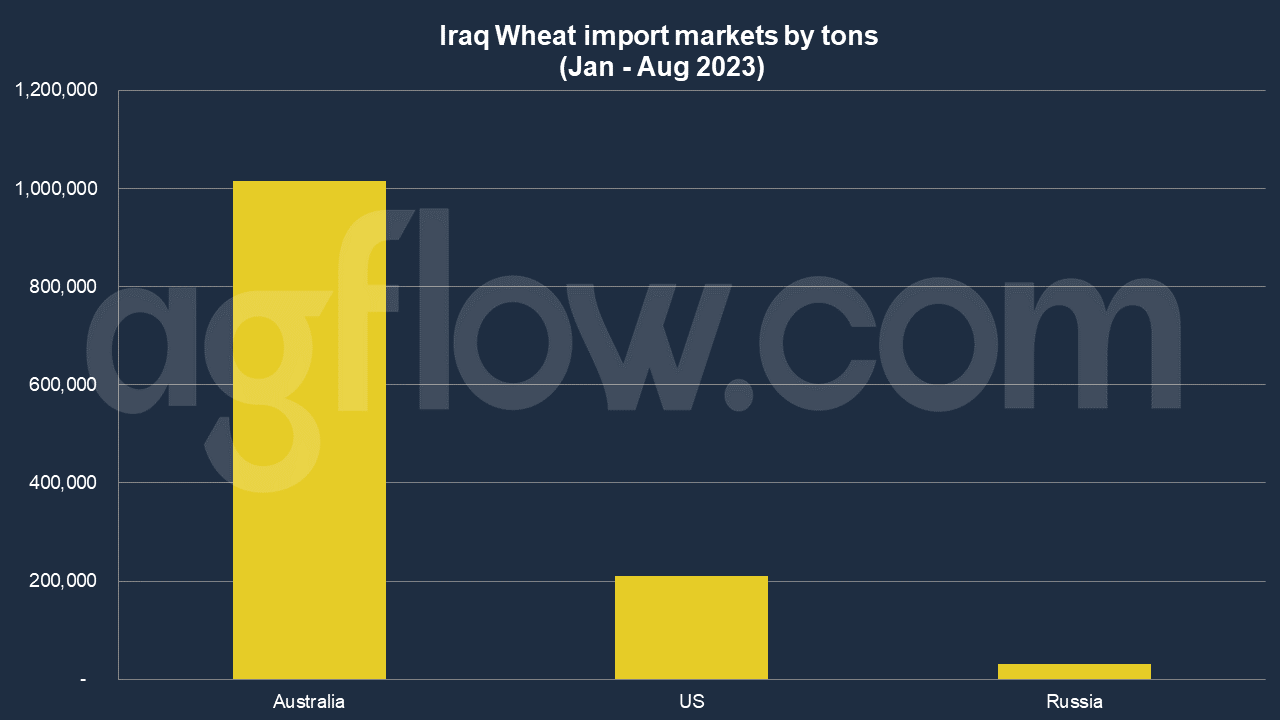Iraq Wheat Imports: Australia Beats the US
Talk to our team about AgFlow's offering →
Reading time: 2 minutes
In the vast landscape of global agriculture, few crops stand as tall as wheat. It’s not just a staple grain; it’s a symbol of sustenance, civilization, and economic power. And for countries like Iraq, wheat holds special significance. But what are the key factors that impacted Iraq’s wheat trade and imports during the months of January to August 2023? Let’s delve deeper into this riveting subject.
Iraq plans to boost its wheat output by almost 60% this year, even as it continues to rely on imports to satisfy domestic demand. The country is projected to produce 3.5 million tons of wheat this year, up from about 2.2 million tons last year, according to Haider Nouri, director general of Iraq’s grain board. As a winter crop, wheat is sown between October-November and harvested between March-April.
Why is Iraq Talking About Wheat?
To the uninitiated, this might seem like a rhetorical question. But when you consider that Iraq, with its diverse topography and climate, is primarily known for oil exports, the emphasis on wheat gains an intriguing dimension. Historically, the region known as Mesopotamia was a cradle of agriculture, with wheat being a primary crop. Today, however, Iraq has to weigh the scales between self-sustenance and the economic feasibility of importing this precious grain.
Balancing Act: Self-sufficiency vs. Economic Realities
Imagine standing on a seesaw. On one end, you have the ambitious goal of agricultural self-sufficiency; on the other, the harsh economic and climatic realities. This delicate balance has been the story of Iraq’s wheat imports in 2023.
The drive towards self-sufficiency, especially in staple crops, stems from the need for food security. But achieving this is akin to chasing a mirage in the desert for Iraq. Why? Challenges such as erratic rainfall, outdated farming techniques, and a struggling infrastructure often impede the dream. The country’s wheat demand surpasses its production capabilities, making imports an option and a necessity.
So, what happens when we shift our gaze from fields to numbers? The trade-offs become evident. While importing wheat might seem like a straightforward solution to the deficit, it’s an economic puzzle. With fluctuating global prices, the dynamics of demand and supply, and geopolitical factors, the costs of wheat imports can strain an already stretched national budget.
The Dance with Global Partners
Now, consider the dance of diplomacy. Iraq isn’t just buying wheat; it’s engaging in a delicate ballet with its trade partners. In 2023, challenges abound. Some countries had bumper yields while others faced shortages. How does Iraq navigate these waters? It’s a blend of strategic partnerships, foresight, and perhaps, a touch of luck. As per AgFlow data, Australia exported 0.1 million tons of Wheat to Iraq in Jan – Aug 2023, followed by the United States (209,598 tons) and Russia (30,000 tons).

An Audience of Many: Speaking to Both Masses and Masters
By this point, one might wonder, “Isn’t this just a story of another commodity?” In some ways, yes. But here’s where the analogy of wheat as the “fabric” of society comes in. It’s not just about economic numbers; it’s about daily bread on a family’s table, and, at the same time, a crucial line in a corporate balance sheet.
To the general public, the ebb and flow of the wheat trade might seem distant, but its repercussions are close. From the prices of everyday goods to the stability of a nation, wheat plays a part. Meanwhile, professionals in the agricultural commodity industry watch the wheat trade like hawks, understanding its cascading effects on global markets.
Conclusion: A Grain, A Symbol, A Reality
As we reflect on the eight months of 2023, Iraq’s wheat trade and imports journey is more than just a tale of a grain. It’s a story of aspirations, challenges, realities, and the perpetual balancing act of a nation. With every kernel of wheat lies a universe of stories, trade-offs, and decisions, reminding us that even the smallest threads hold profound significance in the vast tapestry of global economics.
Try AgFlow Free
Access Free On Updates for Corn, Wheat, Soybean,
Barley, and Sunflower Oil.
No Credit Card Required & Unlimited Access In Time

